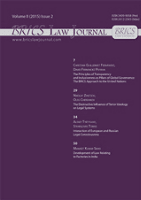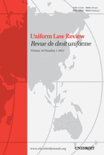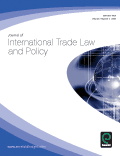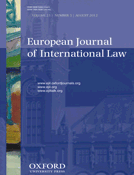
Manchester Journal of International Economic Law
Scope & Guideline
Navigating the Nexus of Law and Global Economics
Introduction
Aims and Scopes
- International Trade Law:
The journal explores the intricacies of international trade law, including WTO regulations, trade agreements, and dispute resolution mechanisms, emphasizing how these elements interact with global economic dynamics. - Investment Law and Dispute Resolution:
A core area of focus is the legal frameworks governing international investments, including bilateral investment treaties (BITs) and the mechanisms for investor-state dispute resolution, highlighting their implications for host states and investors. - Economic Regulation and Governance:
The journal investigates regulatory frameworks governing economic activities, including issues such as antitrust laws, digital trade, and environmental regulations, reflecting on their impact on global markets. - Development and Human Rights:
An emerging focus is on the intersection of economic law with development policies and human rights, examining how legal frameworks can promote or hinder socio-economic development and protect individual rights. - Emerging Technologies and Law:
The journal pays particular attention to the legal implications of emerging technologies such as blockchain, cryptocurrencies, and digital currencies in the context of international economic transactions.
Trending and Emerging
- Digital Trade and Data Governance:
An increasing focus on the governance of digital trade and cross-border data flows indicates a recognition of the significance of technology in shaping international economic law and the need for legal frameworks that adapt to these changes. - Sustainable Development and Environmental Law:
There is a growing trend towards integrating sustainable development principles within international economic law, particularly in investment treaties and trade agreements, reflecting a global shift towards environmentally conscious economic practices. - Human Rights in Economic Law:
The intersection of human rights and international economic law is gaining traction, as scholars increasingly examine how economic agreements can support or undermine human rights protections, particularly in developing countries. - Resilience in Global Supply Chains:
Recent publications emphasize resilience in global supply chains, particularly in light of disruptions caused by crises such as the COVID-19 pandemic, prompting discussions on legal frameworks that enhance supply chain stability. - Post-Pandemic Economic Recovery:
The journal has seen an uptick in discussions surrounding legal strategies for post-pandemic economic recovery, focusing on how international economic law can facilitate equitable recovery efforts across nations.
Declining or Waning
- Traditional Concepts of Sovereignty:
Discussions centered around traditional notions of state sovereignty and its inviolability in international law have decreased as scholars shift towards more complex interdependencies and global governance frameworks. - Focus on Developed Countries' Practices:
There has been a noticeable reduction in analyses centered exclusively on the practices of developed countries in international economic law, with a growing emphasis on developing countries' perspectives and challenges. - Static Legal Frameworks:
The exploration of static or unchanging legal frameworks in international economic law has waned, as the focus has shifted towards dynamic and adaptive legal responses to rapidly evolving global economic conditions.
Similar Journals

BRICS Law Journal
Connecting Legal Minds in Emerging EconomiesBRICS Law Journal is a prominent peer-reviewed publication dedicated to the exploration and critical analysis of legal issues pertinent to the BRICS nations—Brazil, Russia, India, China, and South Africa. Published by LLC V EM PUBLISHING HOUSE, this journal has established itself as an essential resource since its inception in 2014, offering Open Access to foster global research dissemination and collaboration. With an impact factor that reflects its academic rigor, the journal has achieved a commendable Q2 ranking in the field of Law as per the 2023 category quartiles. It is indexed in Scopus, where it holds a rank of #615/1025 in Social Sciences—Law, showcasing its relevance and influence within the legal scholarly community. The BRICS Law Journal aims to address contemporary legal challenges and policy developments in the region, making it a vital resource for researchers, practitioners, and students seeking to engage with the evolving legal landscape and contribute to the discussions that shape the future of law in these diverse nations.

JOURNAL OF WORLD TRADE
Navigating the Complexities of World Trade RelationsJOURNAL OF WORLD TRADE, published by Kluwer Law International, is a premier academic journal dedicated to the in-depth exploration of international trade, law, and economics. With an ISSN of 1011-6702 and an E-ISSN of 2210-2795, this journal has become a significant resource for researchers, professionals, and students alike since its inception in 1996, offering valuable insights into the complexities of global trade relations and international legal frameworks. The journal is recognized for its robust academic contributions, holding a Q3 classification in both Economics and Econometrics and Political Science and International Relations for 2023, with an impressive Q2 ranking in Law. The Scopus rankings further highlight its influence within the academic community, particularly in the fields of law and political science. Although it is not an open-access journal, it remains an essential reference for those engaged in scholarly discussion and practical applications of international trade laws. The JOURNAL OF WORLD TRADE is essential for anyone interested in advancing their understanding of the challenges and evolutions within the complex landscape of global trade.

Uniform Law Review
Connecting Scholars and Practitioners in Legal InnovationUniform Law Review is a premier academic journal dedicated to the field of law, published by Oxford University Press. With its ISSN 1124-3694 and E-ISSN 2050-9065, the journal serves as an essential resource for scholars, legal practitioners, and students engaged in exploring uniform laws and their implications across different jurisdictions. Established in 1996, the journal has maintained a strong presence in legal academia, evidenced by its ranking in the Q2 category of law journals (2023) and its position within the 34th percentile of Scopus rankings for social sciences law. Although currently not available as Open Access, Uniform Law Review offers rich content that spans theoretical and practical perspectives on harmonization of laws, legal reforms, and contemporary legal challenges. With contributions from leading experts and an extensive archive of articles, the journal is pivotal for understanding the evolution of law on an international scale, making it an indispensable tool for research and professional practice.

Asia Pacific Law Review
Innovating Legal Perspectives for the Asia Pacific RegionWelcome to the Asia Pacific Law Review, a prestigious academic journal published by Taylor & Francis Ltd that serves as a vital resource for scholars, practitioners, and students in the field of law. With its ISSN 1019-2557 and E-ISSN 1875-8444, this journal critically examines legal issues pertinent to the Asia Pacific region and promotes scholarly discourse. Recognized in the Q3 category for law by the 2023 category quartiles, the Asia Pacific Law Review stands out with a Scopus ranking of #574 out of 1025, placing it in the 44th percentile within the Social Sciences _ Law category. Spanning from 2008 to 2024, the journal aims to present innovative research, policy analyses, and significant case studies that illuminate the evolving legal landscape in the region. While the journal does not offer Open Access, it remains an essential platform for high-quality legal scholarship, contributing to the advancement of legal knowledge and practice in the Asia Pacific area.

Journal of International Trade Law and Policy
Unveiling Insights in International Trade DynamicsThe Journal of International Trade Law and Policy, published by Emerald Group Publishing Ltd, serves as a crucial platform for the dissemination of research in the fields of international trade law, economics, and political science. Established in 2002, this journal aims to explore the complexities and evolving landscape of trade laws and policies globally, offering valuable insights for researchers, practitioners, and policymakers alike. With an impact factor reflecting its reputable standing, the journal is ranked in the Q3 and Q4 categories across various domains including Law, Political Science, and Industrial Relations, indicating its relevance and contribution to academic discourse. The journal remains committed to advancing knowledge while embracing rigorous peer review processes. Although open access options are currently not available, the journal’s extensive archive promises to be a rich resource for those invested in international trade dynamics as it embarks on its journey toward 2024.

International Community Law Review
Illuminating Challenges in International Law.International Community Law Review, published by MARTINUS NIJHOFF PUBLISHERS, is a distinguished journal that contributes significantly to the fields of law and international relations. With an ISSN of 1871-9740 and an E-ISSN of 1871-9732, this journal serves as a vital platform for scholarly discourse on issues pertaining to international law, promoting a deeper understanding and engagement with complex legal frameworks and global challenges. Currently classified in the Q3 quartile for Law and Political Science and International Relations, the International Community Law Review ranks 475 out of 1025 in the Law category and 386 out of 706 in Political Science, reflecting a moderate impact in the academic community. Though it does not currently offer Open Access, the journal's extensive coverage from 2007 through 2024 ensures that it remains a relevant resource for researchers, professionals, and students. Published in the Netherlands, this journal aims to foster the development of international legal thought, support academic research, and facilitate discussions that shape modern international legal practices.

Netherlands International Law Review
Fostering Insightful Discourse in Global JurisprudenceNetherlands International Law Review is a prestigious academic journal dedicated to the exploration and analysis of international law. Published by Springer International Publishing AG, this journal has established itself as a leading platform for scholarly discourse since its inception in 1953. With its ISSN 0165-070X and E-ISSN 1741-6191, it is indexed in high-impact databases and has achieved an impressive Q1 ranking in the field of Law as of 2023, further solidifying its reputation as a critical resource for legal scholars and practitioners. With its latest Scopus rank of #243 out of 1025 in the Social Sciences (Law) category, the journal exemplifies the high level of research excellence it promotes. The Netherlands International Law Review aims to foster insightful discussions on contemporary issues in international law, making it an invaluable resource for researchers, professionals, and students alike who seek to stay informed on the latest developments and theoretical advancements in this dynamic field. Access to current issues is available through traditional subscription formats, providing a comprehensive view of the evolving legal landscape.

Asian Journal of WTO & International Health Law and Policy
Bridging Trade and Health: Insights for a Global FutureAsian Journal of WTO & International Health Law and Policy, published by NATL TAIWAN UNIV PRESS, serves as a critical platform for interdisciplinary scholarship at the intersection of international trade law and public health. Its ISSN is 1819-5164. Based in Taiwan, the journal aims to foster dialogue and discussion regarding the intricate legal frameworks that govern global health policies, particularly in the context of World Trade Organization regulations. With a focus on the evolving landscape of health law and policy from a socio-economic and international relations perspective, the journal contributes valuable insights that resonate with researchers, professionals, and students alike. Although it currently holds a Q4 ranking in several fields including Economics, Health (Social Science), Law, Political Science, and Public Health, its commitment to quality scholarship is evident in its ongoing publication from 2009 to 2012 and 2016 to 2024. While the journal does not offer Open Access options, it remains an essential resource for those looking to deepen their understanding of health law in a global context, making significant contributions to both the academia and practical applications in policy-making.

AUSTRALIAN BUSINESS LAW REVIEW
Shaping the future of business law discourse.Australian Business Law Review, published by Lawbook Co Ltd, is a premier peer-reviewed journal dedicated to the exploration and analysis of business law in the Australian context. With the aim of enhancing legal scholarship and practical understanding in this critical field, the journal addresses a wide range of topics including corporate governance, contract law, trade practices, and regulatory frameworks, making it an essential resource for legal practitioners, researchers, and students alike. The journal is recognized for its rigorous editorial standards and relevance in shaping discussions surrounding current legal issues, reflecting the complexities of the modern business environment. Although it does not operate on an Open Access model, the Australian Business Law Review remains a vital publication that contributes significantly to the discourse on business law, ensuring its readers stay informed about the latest developments and scholarly debates.

European Journal of International Law
Fostering critical dialogue in international law and politics.The European Journal of International Law (EJIL), published by Oxford University Press, stands as a leading platform for the dissemination of innovative research in the realms of International Law and Political Science. With an impressive ISSN of 0938-5428 and E-ISSN of 1464-3596, this prestigious journal has achieved Q1 rankings in both Law and Political Science and International Relations categories as of 2023, emphasizing its significance among contemporary scholarly publications. Spanning contributions from a diverse range of disciplines, the EJIL serves as an essential resource for researchers, professionals, and students alike, promoting critical dialogue on pressing international legal issues. Although currently not offered as an open-access journal, it continues to retain a high impact factor, as evidenced by its substantial Scopus rankings, placing it within the top percentiles in multiple categories. Its commitment to scholarly excellence is reflected in a convergence of research trends from 2005 to 2024, and it remains dedicated to fostering informed discourse on global legal frameworks and their implications.